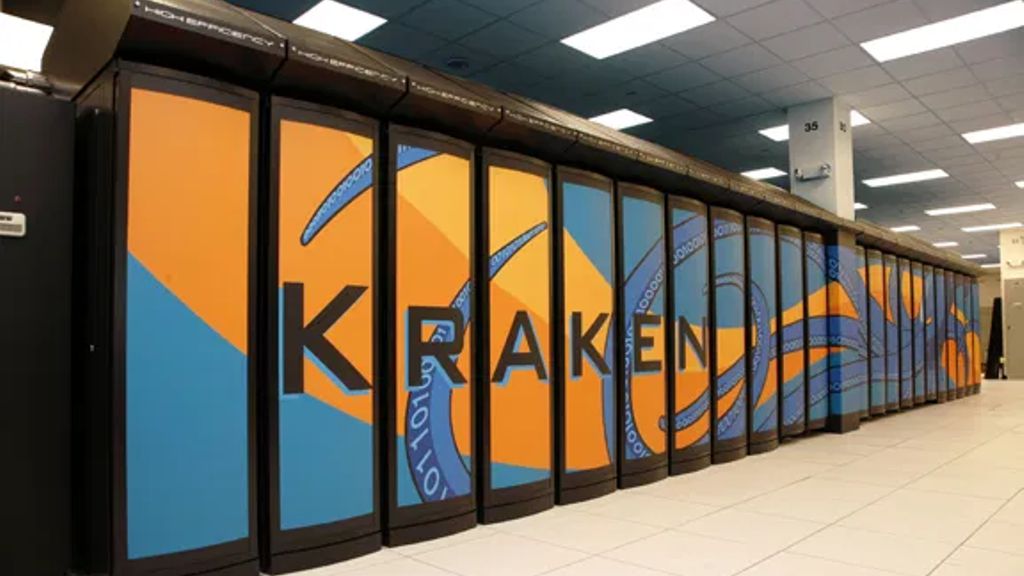KNOXVILLE — The University of Tennessee’s supercomputer, Kraken, has broken a major barrier to become the world’s first academic supercomputer to enter the petascale, performing more than 1 thousand trillion operations per second, a landmark achievement.
Kraken is only the fourth supercomputer of any kind to break the barrier, and that computing power already is being applied to high-level science that is changing the way researchers study everything from the innermost workings of our cells to giant astrophysics questions that shed light on the origins of the universe.
Along the way, the computer, funded by a $65 million grant to UT Knoxville from the National Science Foundation, has created more than 25 full-time jobs and helped place Tennessee at the center of big science. Kraken first entered operation in late 2007, and has expanded through a series of planned upgrades that have made it progressively faster and more powerful. The computer’s most recent upgrade was officially completed today.
“This milestone is an example of the University of Tennessee’s growing achievements in the area of supercomputing. It helps us attract better students and faculty, and thus raises the profile of our university and the state of Tennessee,” said Interim UT President Jan Simek.
More than 250 projects are either under way or have already been completed on the computer since it was first came online, and a significant number of the projects are being undertaken by Tennessee researchers. In fact, UT Knoxville faculty have conducted 33 projects on the Kraken system — more than any other university.
Kraken’s power makes it possible for scientists to create complex models to simulate processes in the real world in more understandable ways. Those models can be used to address issues from health and medicine to alternative energy.
Among the projects conducted by UT Knoxville scientists on Kraken are: enhancing the efficiency of biofuels in both production and use, developing more effective climate and weather modeling to address issues from severe weather to climate change, creating novel new materials with a wide variety of uses and analyzing disorders that throw the heart out of rhythm.
“Having Kraken has made UT Knoxville a magnet for great faculty and world-leading research,” said UT Knoxville Chancellor Jimmy G. Cheek. “Being the first academic computer this powerful means that we will continue not only to enhance our reputation as a research institution, but also that we will continue to take the lead in making life better for people both in Tennessee and around the world.”
Kraken is made up of almost 100,000 computing cores, and it gets its power by making those cores work together in the most effective way possible on any given problem. One way to visualize the way Kraken works is by imagining a completely full Neyland Stadium where everyone – fans, players, coaches and staff – are working on individual laptops on the same problem. Kraken harnesses that combined power to tackle major scientific questions.
“At over a petaflop of peak computing power, and the ability to routinely run full machine jobs, Kraken will dominate large-scale NSF computing in the near future,” said Phil Andrews, director of the National Institute for Computational Science, which manages Kraken. “Its unprecedented computational capability and total available memory will allow academic users to treat problems that were previously inaccessible.”
Beyond its computing power, Kraken, a Cray XT5 computer, also has a massive amount of memory to store the information used in scientists’ large-scale projects. With 129 terabytes of memory, Kraken can store the equivalent of more than 10 million phonebooks.
As the first computer managed by a university to pass this milestone, Kraken puts UT in front of other major computing centers across the country, while enhancing the national research effort through Kraken’s role in NSF’s nationwide network of computers called TeraGrid, the largest computational platform for open scientific research. Kraken is housed in the computing facilities at Oak Ridge National Laboratory, which are also home to another petascale computer, called Jaguar.
The Retirement of Kraken: Remembering the Accomplishments of the First Academic Computer to Break the Petaflop Barrier








